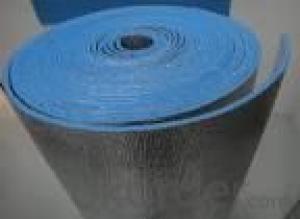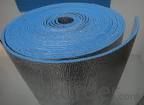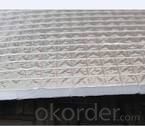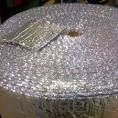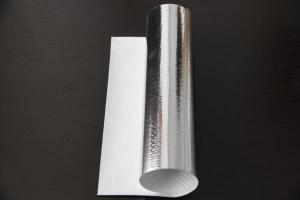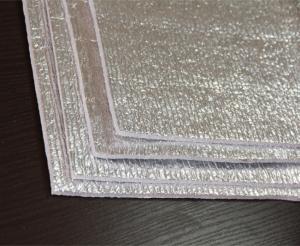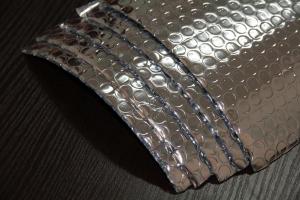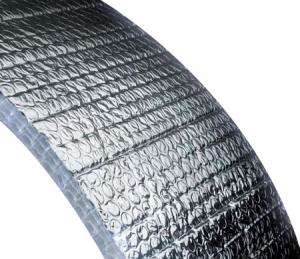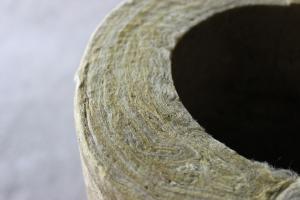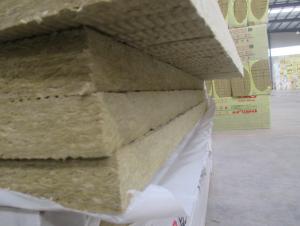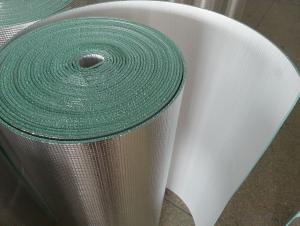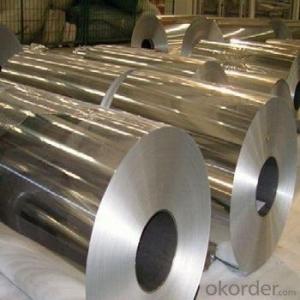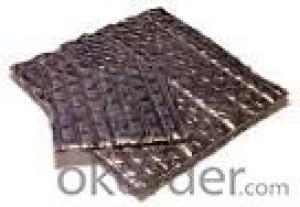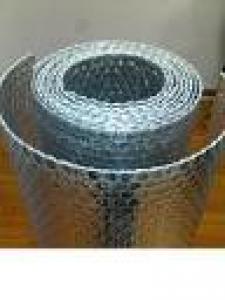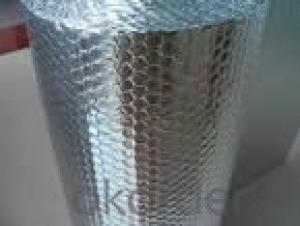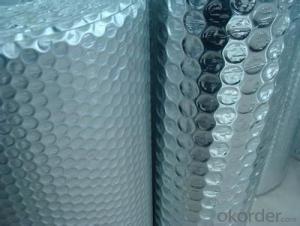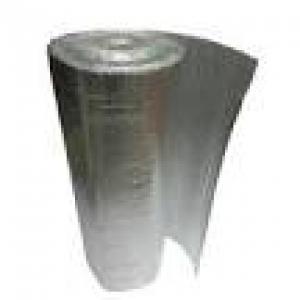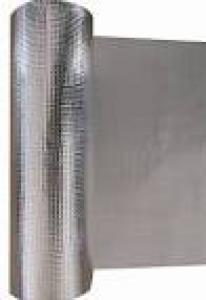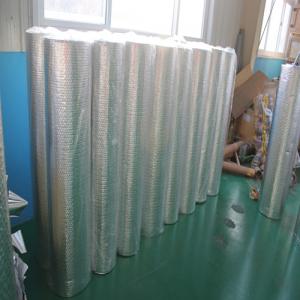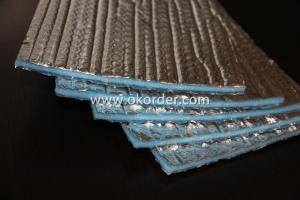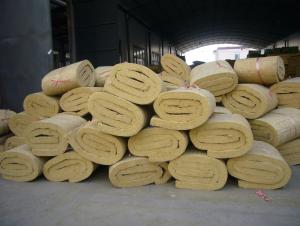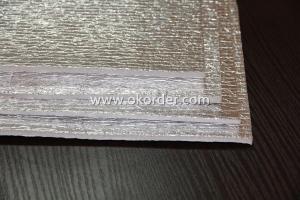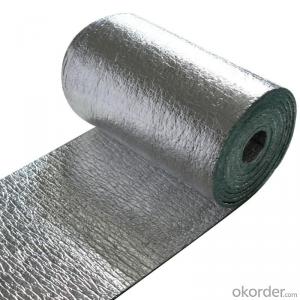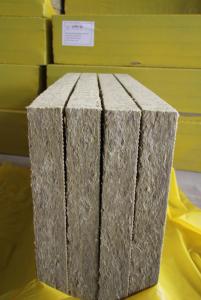Polystyrene Roofing Insulation - Aluminum Foil Coated Bubble Insulation Type 19
- Loading Port:
- Shanghai
- Payment Terms:
- TT OR LC
- Min Order Qty:
- 10000 m²
- Supply Capability:
- 100000 m²/month
OKorder Service Pledge
OKorder Financial Service
You Might Also Like
Bubble Insulation Benefits:
Reflects 96% of radiant heat
Non-toxic / Non-carcinogenic
Does not require protective clothing or respirators to install
Durable and lightweight
Does not compress, collapse or disintegrate
Vapor and radon retarder
Easy to cut and install
Permanent and maintenance-free
Does not provide a growth medium or nutritive value for fungus, insects, or rodents
Does not support the growth of mold or mildew
Not affected by moisture or humidity
Lowers heating and cooling costs year round
Bubble Foil Application:
Metal & Steel Buildings
Homes
Roof Underlayments
Cathedral Ceilings
Crawl Spaces
Hot Water Heaters
Basement Walls
Floors
Garage Doors
Concrete slabs
Driveway snow melts
Pole barns
Post frame buildings
Poultry barns
Animal kennels
Temperature sensitive storage areas
Air Bubble Foil Insulation Tech Data:
Material Structure: AL/Bubble/AL | ||
Bubble Size:D10mm*H 4mm(10*2.5/10*4/10*6/20*7/25*10)choose the bubble size | ||
Bubble Weight:0.13kg/m2 ( can be customized ) | ||
Roll Width:1.2m (lenth can be customized) | ||
PROPERTIES | TEST DATA | UNIT |
Thickness | 3.5-4 | mm |
Weight | 250 | g/m2 |
Emissivity | 0.03-0.04 | COEF |
Thermal conductivity | 0.034 | w/m0 |
Apparent Density | 85 | kg/m3 |
Reflectivity | 95-96 | % |
Water Vapour Transmission | 0.013 | g/m2kpa |
Corrosion | doesn't generate | |
Tensile Strength(MD) | 16.98 | Mpa |
Tensile Strength(TD) | 16.5 | Mpa |
- Q: Should a two story home have insulation under the roof in the big closets ?
- Hell yes it should. A lot of contractors skimp on insulation though. Every singe area in your attic under your roof needs fiberglass insulation or you will lose heat and air and your electric bill will be higher. Heat rises and u will lose it fast in the winter if there is just one small spot without it.
- Q: were can i buy material to insulate pans and instructions to install it? I have seen many roofs with this done ,but , the lowe,s and home depots don't have .
- you do now not desire insulation for this application. in case you have now not offered the metallic yet i might advise searching for a status seam roof equipment that the panel would not are available touch with the substrate and would not use uncovered fasteners. If contained sooner or later you probably did be certain to surround the porch and upload warmth you ought to insulate the ceiling and depart an air area below the decking that ought to be ventilated from the eave to the ridge. a chilly roof assembly with proper air flow will dramatically cut back the flexibility of the metallic panels sweating.
- Q: I live in central florida. I plan on installing R-30 insulation to the floor of my attic. How effective is it to install reflective insulation to the attic on the roof side? Is it worth the price?
- the best floor insulation is the two on the roof or the 1st floor ceiling, (floor of the attic), no longer the two. If that is already on the ceiling, the attic is vented to the exterior, and insulating the roof could make little or no distinction. Laying one extra 'blanket on the floor is a thank you to bypass in case you prefer to enhance. Insulating a roof will boost the summer season temperature of the roofing, and could adversely result the life of a few components.
- Q: I am really confused about this science stuff! Sustainability is terrible xP
- All versions of insulation are largely air that is kept from moving - air is a good insulator if convection - movement of heated or cooled air due to changes of density - is prevented. This assumes that a vapor barrier and caulking prevent actual air movement through the wall when a wind is blowing. Some insulators are also poor conductors of heat so the connection between inside and outside that might occur is broken. As it happens, glass used in fiberglass and minerals used in rock wool are actually pretty good conductors of heat in solid form but as fine particles and flakes they don't conduct well from one strand/piece to the next.
- Q: ... building code max. (R-50)???
- "R" I think stands for "Resistance" factor against heat loss. It resists the heat transfer but doesn't stop it. There is no such thing as perfect insulation. Snow itself is a rather good insulator. So even though you are only losing very little heat, the snow on top of the snow directly on the roof helps trap that heat at the bottom. So the first layer will melt.
- Q: I am building a porch roof over an existing patio. The rafters are fabricated I-beams. I plan on putting aluminum soffit under the I-beams. On top of the roof I would like to put down a metal roof. I already put down 3/4" OSB and a rain/ice barrier. Do I need insulation and/or ventilation on top of the rain and ice barrier, or can I get away without it?
- You don't need insulation for this application. If you haven't purchased the metal yet I would recommend looking for a standing seam roof system that the panel does not come in contact with the substrate and does not use exposed fasteners. If in the future you did decide to enclose the porch and add heat you could insulate the ceiling and leave an air space under the decking that could be ventilated from the eave to the ridge. A cold roof assembly with proper ventilation will dramatically reduce the potential of the metal panels sweating.
- Q: Hi, my building is hot in temperature in summers, so I am finding ways to tackle the problem by placing some heat insulating materials against the sunlight on the roof of my building. I have found several possible solutions, but none of them close to perfect. 1. grass layer: hard to maintain2. heat-insulating brick: might be too heavy to carry them to the roof3. heat-insulating coating: would it be damaged if we step on them? Are there things like heat-insulating carpets that would be convenient to instal?
- If you're redoing the roof, a radiant barrier under the sheathing helps. So does insulation. And also, if there is an attic space there, consider putting in a fan to blow the hot air out.
- Q: what's the best insulation for ceilling for house with semi flat roof?
- The pitch of your roof has nothing to do with the kind of insulation you should use. I recommend a fiberglass insulation that is at least 6 inches thick, the more you put in the better.
- Q: I have a vented metal roof. WV winters
- Check into heat tape tied to pipe, with insulation wrapped around that. turns on when freezing temperatures. insulation by itself, will not stop it from freezing if left for long periods without water moving through it. .
- Q: fixing my room up and it gets hot in summer so i want to put some good insulation in the roof so what could i use?
- How much access do you have to the attic, or the space below the roof? Are you going to be replacing the ceiling of your room and adding insulation from below, or getting into the attic and adding insulation above your room from there? If there is a large attic space above your room, and not much ventilation, sometimes you can cool the living space by simply installing some ventilation grilles to the roof to vent off hot air from the attic.
Send your message to us
Polystyrene Roofing Insulation - Aluminum Foil Coated Bubble Insulation Type 19
- Loading Port:
- Shanghai
- Payment Terms:
- TT OR LC
- Min Order Qty:
- 10000 m²
- Supply Capability:
- 100000 m²/month
OKorder Service Pledge
OKorder Financial Service
Similar products
Hot products
Hot Searches
Related keywords
